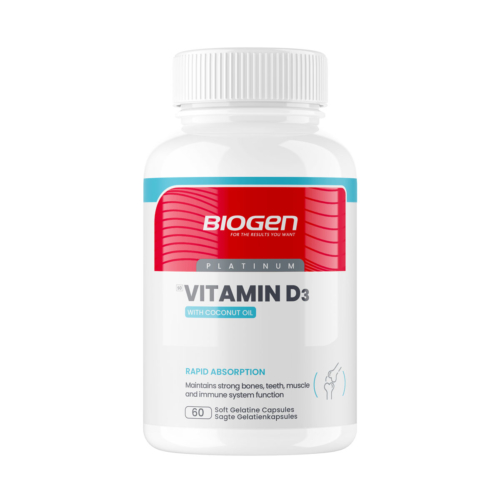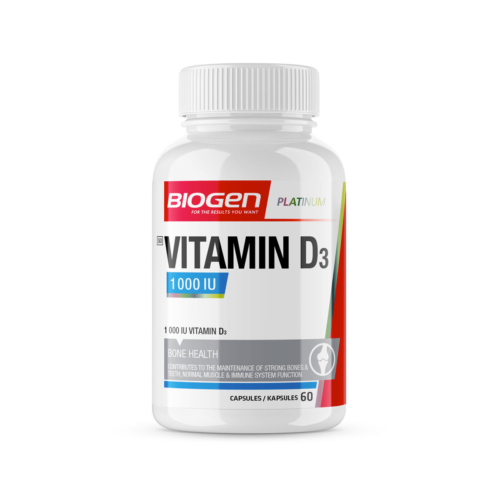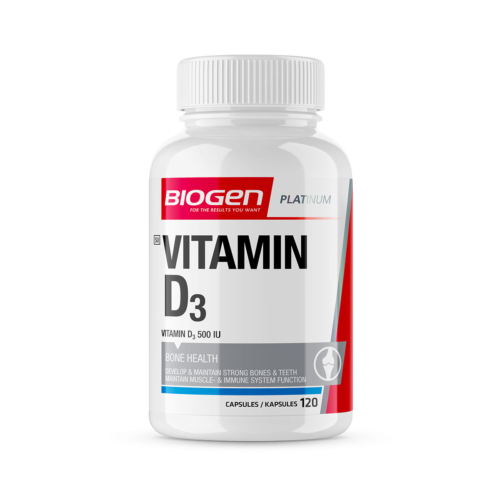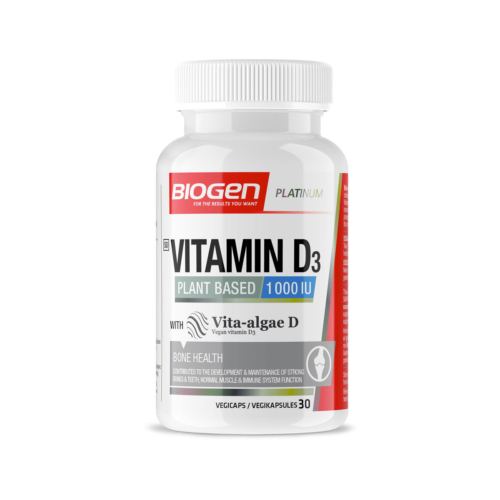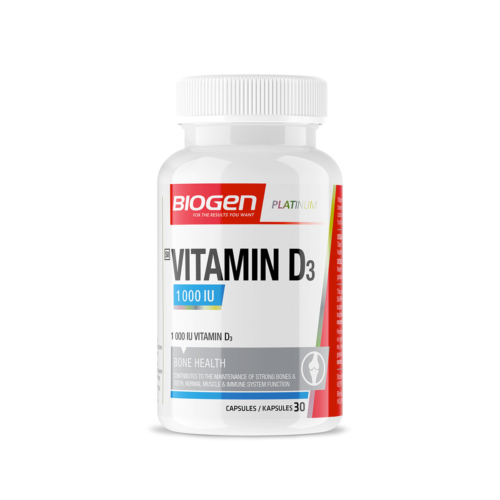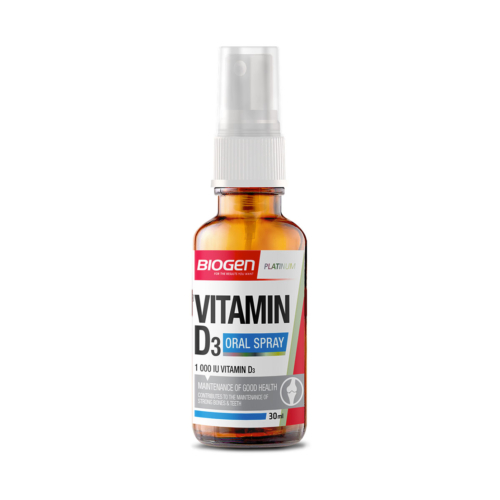
Why a Vitamin D3 Supplement Is Essential for Immune Support This Winter
Bundling up during winter may keep you warm, but it can also limit our exposure to the sun, which we need to produce a vitamin crucial to our immune system – vitamin D3.
Vitamin D is called the ‘sunshine vitamin’ because our bodies produce it when we expose our skin to the sun’s ultraviolet B (UVB) rays.
The shorter days, greater distance between Earth and that big ball of fiery gas at the centre of our solar system, and multiple layers of clothing mean less UVB radiation reaches our skin during winter, when we need it most.
While some foods like fatty fish (salmon, mackerel), egg yolks, and fortified foods contain vitamin D, it’s often challenging to get enough through our diet alone, which is why boosting your intake with a vitamin D3 supplement can deliver immune-boosting benefits.
Identifying a Deficiency
The symptoms associated with a vitamin D deficiency often go unnoticed, as they are often varied and sometimes vague.
Common symptoms include:
- Fatigue and tiredness: Feeling unusually tired or lacking energy.
- Bone pain or achiness: This can occur in any bone, but is often felt in the back, hips, and legs.
- Muscle weakness: Feeling weak, especially in the muscles close to the trunk, making it difficult to rise from a chair or climb stairs.
- Muscle issues: You can sometimes experience muscle aches, cramps, or spasms.
- Mood changes: You may experience depression or feelings of sadness.
Other less common symptoms may include frequent illnesses or infections, bone loss or low bone density, increased sensitivity to pain, slow wound healing, hair loss, poor sleep quality, loss of appetite, pale skin, and tingling or “pins and needles” sensation in the hands or feet.
Vitamin D and Our Immune System
While we need adequate vitamin D for numerous reasons, like calcium absorption and gene expression, it is critical for our immune system.
Getting enough vitamin D in winter is especially important to reduce the risk of catching a cold or the flu, which becomes more prevalent during this time.
Vitamin D supports the immune system in two distinct ways – via its immunomodulatory and immunostimulatory effects¹.
Immunomodulatory effects
As an immunomodulator, vitamin D acts as a chemical agent that helps to regulate and balance how the immune system functions, interacting with both the innate (early response) and adaptive (later, specific response) immune systems.
For instance, vitamin D stimulates immune cell expression², increasing levels of antimicrobial proteins such as B lymphocytes and killer T cells that destroy invading germs and viruses, and helps to maintain cell integrity.
These cells contain vitamin D receptors and synthesise the active form of vitamin D called calcitriol (vitamin D3). This means that vitamin D plays a vital role in modulating the adaptive immune system’s response to infections.
In this process, vitamin D enhances the ability of immune cells to engulf and destroy pathogens and eliminate them and any damaged cell components.
Furthermore, there is evidence to suggest that vitamin D plays an important role in our innate immunity – the immediate, non-specific immune defence system – by helping to reduce excessive inflammation and modulating the production of pro-inflammatory cytokines³.
Immunostimulatory effects
When we experience a vitamin D deficiency, which is not uncommon during winter, our immune system may fail to respond properly to invading pathogens like bacteria or a virus.
Introducing additional sources can have an immunostimulatory effect, which can enhance our body’s ability to fight off infections by restoring our antimicrobial defences and improving immune cell function.
This is where a vitamin D supplement can help to compensate for a lack of exposure to natural sunlight during winter, with vitamin D3 generally considered the most effective option to boost circulating levels of vitamin D’s active form (known as calcitriol).
Boosting vitamin D levels
You can find vitamin D3 supplements in various forms, including powders, capsules, tablets and sprays.
A vitamin D3 powder mixes easily with water, offering a suitable option for anyone who struggles to swallow capsules or tablets. When mixed with liquid, your body can absorb the vitamin D3 more quickly into the bloodstream compared to a tablet that needs to dissolve first. This is also a great option to mix into smoothies or juices for a nutritional boost.
Vitamin D3 tablets or capsules offer convenience and precise dosages, which make them ideal for daily use and travel. Tablets often have a coating that helps to mask any unpleasant taste of the vitamin D3, and generally last longer due to better protection from environmental factors.
Your other option is a sublingual spray, which offers a novel and potentially more effective delivery system⁴ because the body absorbs the vitamin D3 faster through the mucosal lining beneath the tongue, which is an area rich in vascular blood supply. A sublingual spray is also a quick and convenient method to take your daily dose of vitamin D3.
References:
- Athanassiou L, Mavragani CP, Koutsilieris M. The Immunomodulatory Properties of Vitamin D. Mediterr J Rheumatol. 2022 Mar 31;33(1):7-13. doi: 10.31138/mjr.33.1.7. PMID: 35611096; PMCID: PMC9092099.
- Martens PJ, Gysemans C, Verstuyf A, Mathieu AC. Vitamin D’s Effect on Immune Function. Nutrients. 2020 Apr 28;12(5):1248. doi: 10.3390/nu12051248. PMID: 32353972; PMCID: PMC7281985.
- Valdés-López JF, Velilla P, Urcuqui-Inchima S. Vitamin D modulates the expression of Toll-like receptors and pro-inflammatory cytokines without affecting Chikungunya virus replication, in monocytes and macrophages. Acta Trop. 2022 Aug;232:106497. doi: 10.1016/j.actatropica.2022.106497. Epub 2022 May 1. PMID: 35508271
- Naimish, Sarkhejiya & Patel, Vipul & Devang, Pandya. (2013). SUBLINGUAL DELIVERY: A PROMISING APPROACH TO IMPROVE BIOAVAILABILITY.


